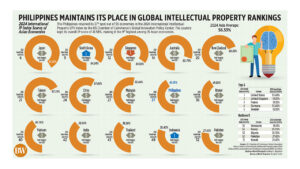Who is more prepared for the presidency?

As the election season reaches its last mile, the race for the presidency has become a two-horse race. On one hand, we have Ferdinand Marcos, Jr. who operates with the advantage of money, machinery, and might of political dynasties. On the other hand, we have Vice-President Leni Robredo whose campaign is propelled by an army of hard-working, dedicated volunteers.
On the shoulders of the next president are serious problems that will require immediate attention. The economy has lost momentum following the pandemic. Foreign debts are at their maximum tolerable levels while poverty and unemployment have spiked anew. In terms of national security, China’s creeping invasion continues to advance, emboldened by President Rodrigo Duterte’s passive (or permissive) policy towards China’s encroachment. Exacerbating matters are national emergencies such as the state of education in the country.
Who between Marcos and Robredo is in a better position to solve these problems? I would have wanted to make a point-by-point comparison between the two but Marcos offers no platform or leadership plan except to say that we must all unite. Robredo, on the other hand, offers a comprehensive agenda.
Without basis for comparison, let me focus on Robredo’s intentions in as far as the economy, China, and education are concerned.
ON THE ECONOMYRobredo offers a sensible plan on how to move the economy forward amid crippling debt and loss of competitiveness. At the heart of it all is job generation. In one masterplan called “Hanapbuhay para sa lahat” (Livelihood for all), Robredo ventures to solve the nation’s biggest problems — poverty, unemployment, and income inequality. The creation of jobs also translates to wealth generation for individuals and the country. This will help solve such threats as the rising national debt, a gaping budget deficit, and the lack of funds for social services. Indeed, job generation cuts through most of our problems. I reckon the plan to be well considered.
Foreign direct investment (FDIs) is the silver bullet that can address our immediate problems and accelerate development. That said, fundamental to Robredo’s plan is to restore trust in government. Restoring trust means leveling the playing field, quashing corruption, and reverting to rule-based governance. Robredo promises to clamp-down on influence peddling, syndicates, and red tape since these are the tumors that make the Philippines unideal for doing business and uncompetitive in attracting investors. With confidence restored, FDIs will pour in, jobs will be created, and lives will improve.
The second aspect of her plan is to awaken Philippine industries. I was delighted to see the inclusion of maritime industries or “the blue economy” in the plan. Blue industries include ship building, ports and shipyards management, logistics services, seafarer crewing, maritime financing, aquaculture, and offshore energy exploration. I’m glad Robredo recognizes the potential of the blue economy — no other president has.
The re-activation of manufacturing industries is another component of Robredo’s economic agenda. There is simply no way out of it — we must industrialize if the country is to grow in wealth. We must recalibrate the economy from being 73% consumption-driven and only 27% production-driven. High growth can only be sustained by a production-based economy. It cannot be done on the back of consumption without stressing debt levels.
Robredo aspires to climb the technology value chain in the IT-KPO (Information Technology-Knowledge process outsourcing) space. She commits to positioning the country as a center of excellence in artificial intelligence, cloud services, genetic medicine, and the like. She also aims to make the Philippines the center of climate industries. This includes manufacturing of electric vehicles and parts, adoption of climate-resilient agriculture, and use of renewable energies.
As for the development of MSMEs (Micro, small and medium enterprises), Robredo plans to give small businesses a shot in the arm by giving them first priority in government procurement.
ON POLICY TOWARDS CHINARobredo will pursue an inclusive and independent foreign policy that favors no specific nation except our own. This is loud and clear.
As for China, Robredo expressed willingness to cooperate in the realms of trade and investments. When it comes to the West Philippine Sea, however, China must first recognize Philippine sovereign ownership over the disputed territories before deals like joint exploration of resources can be pursued. Fundamental to all is China’s recognition of the arbitration ruling of the International Tribunal for the Law of the Seas.
Robredo categorically opposes China’s territorial grab and militarization of the West Philippine Sea. To that, she plans to further strengthen relations with our oldest ally, the United States, to help protect our sovereign rights.
And make no mistake, she will do everything in her power to enforce the decision on the West Philippine Sea in favor of the Philippines.
ON EDUCATIONDeclaring an educational crisis is one of the first acts Robredo will do as President, she said. This will open the door for immediate high-impact reforms and the expeditious release to budgets. Access and quality of education is the challenge that must be addressed.
To this, she commits to appropriate 6% of GDP (from 3% today) towards education to give the Department of Education the ammunition needed to address the struggling sector. Among the priority areas are the overhaul of curriculums to put emphasis on STEM learning (Science, Technology, Engineering and Mathematics); better alignment of curriculums with job opportunities; increasing the salaries of public-school teachers; and improving teacher training programs to re-skill and up-skill.
More teachers will be hired to decrease student-to-teacher ratios. In addition, administrative work will be relaxed for teachers so they can dedicate more time to remedial classes and one-on-one tutoring.
Collaboration between the public and private sectors will be pursued to build more classrooms, dormitories, transportation facilities, and nutritional programs for students. Robredo will also establish Regional Excellence Centers to focus on research and development and to foster closer collaboration between the academe and industry.
In a column last month, I already came out as a supporter of Robredo. My decision stems from her well-considered leadership plan, a solid track record, and a character marked by honesty and humility. As the undecideds contemplate who to vote for, may we look beyond personal biases and choose according to who is truly better prepared for the presidency.
Andrew J. Masigan is an economist
Facebook@AndrewJ. Masigan
Twitter @aj_masigan




